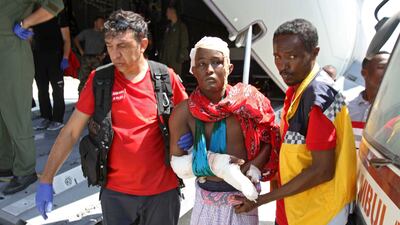It was a busy Saturday afternoon in Mogadishu and the streets of the Somali capital were packed with motorists stuck in downtown traffic. But for the driver of one truck heading towards a checkpoint near the foreign ministry, the journey was already over. Stopped by a policeman for a routine search, he put his foot on the accelerator and his hand on a detonator — unleashing the worst terror bombing the country has ever seen.
The truck smashed through the checkpoint and exploded, its half-tonne payload creating a blast heard citywide. That, though, was just the start. The explosion also hit a fuel tanker parked nearby, igniting a fireball that engulfed the entire street and everyone in it.
As of Monday morning, the death toll had climbed to climbed to 300, making it one of the deadliest vehicle bombings not just in Somalia, but worldwide.
Even by the standards of Mogadishu, where terrorist violence is nothing new, the bomb wreaked carnage on an unprecedented scale. While some victims were buried beneath the smouldering wreckage of demolished buildings, many others were flayed beyond all recognition by the fireball. Rescuers, who are still sifting through the debris of a hotel razed by the blast, said they would probably never know exactly how many died — or who many of them were.
“This is really horrendous, unlike any other time in the past,” said Dr Mohamed Yusuf, director of Mogadishu’s Medina hospital, whose staff dealt with the worst of Mogadishu's civil war years in the 1990s. He said they had been "overwhelmed by both dead and wounded".
Sources told The National that at one hospital, a mother turned up with the pieces of her child. With more than 300 injured, the death toll was expected to rise in coming days.
Abshir Ahmed, a Somali senator, said it was the "deadliest incident" he could remember since Somalia's lapse into civil war in 1990.
Suspicion for the bombing is focused on Al Shabab, the Somali Al Qaeda franchise that has waged war on the country's UN-backed government for a decade.
The group, which used to control much of Mogadishu, was pushed out by a Ugandan-led African Union force in 2011, but continues to operate in the countryside and frequently launches terror attacks on Mogadishu.
It also carried out the 2013 Westgate shopping mall attack in the Kenyan capital, Nairobi, where gunmen massacred 67 people.
As of Monday morning, Al Shabab's normally hyperactive media wing had not admitted to carrying out the Mogadishu bombing. Many speculated that this was because even Al Shabab had been taken back by the scale of the atrocity.
The group suffered a backlash over a previous suicide bombing in Mogadishu in 2009, which killed 24 people at a graduation ceremony for medical students.
"This attack has all the hallmarks of Al Shabab and yet their very upmarket media machine hasn't claimed responsibility," John Steed, a former military adviser to the UN in Mogadishu, told The National. "I'd like to think that even they are too ashamed of the carnage, but I doubt it.
"Somalis are pretty stoic people but this bomb really shaken them. Nearly everyone there knows someone who was killed or injured."
Investigators are now trying to find where the bomber sourced such large quantity of high explosive. At least some of it is believed to be military-grade rather than home-made, leading to some to claim it had been stolen from Amisom, the 20,000-strong African Union force.
The savagery of the bombing also prompted speculation that it might have been the work of Somalia’s fledgling ISIL chapter. At present, though, the group is confined to remote mountains in Somalia’s northern Puntland region and considered incapable of such an attack.
The scale of the casualties ranks the bombing second only to one carried out in Iraq last year, when a lorry bomb killed 324 people in a busy market area in Baghdad during Ramadan. An attack against the Yazidi community in the northern Iraqi town of Kahtaniya in 2007 killed at least 500 people, but involved multiple bombs.
The Somali president, Mohamed Abdullahi Mohamed, declared three days of national mourning, and joined thousands who responded to a plea by hospitals to donate blood for the wounded. “I am appealing to all Somali people to come forward and donate,” he said. On Sunday, hundreds took the streets to protest against the attack.
Muna Haj, 36, whose son died, said: “The oppressors have taken his life away from him. I hate them. May Allah give patience to all families who lost their loved ones in that tragic blast. And I pray that one day Allah will bring his justice to the perpetrators of that evil act.”
The attack came despite a renewed effort by Washington under president Donald Trump to defeat Al Shabab once and for all, involving regular targeted strikes by drones and special forces teams. About 300 special forces troops are understood to be in Somalia, operating alongside local forces, some of whom are trained by the UAE.
Following a drone strike in July that killed Ali Jabal, an Al Shabab commander responsible for operations in Mogadishu, the Pentagon’s Africa Command said it hoped his death would prove a major setback to the group’s ability to hit the Somali capital. That hope now seems to have been somewhat premature.

